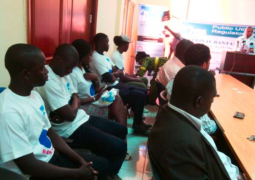Such educational policy should be encouraged to ensure that the 26 per cent of children that are out of school have access to formal education, she pointed out.
Madam Nyanti made these remarks on Thursday whilst delivering a statement on the joint donor review and supervision/implementation support mission conference organised by the Ministry of Basic and Secondary Education at Regional Education Directorate One in Kanifing.
“While more children are in school now than ever before, the high enrollment rate still does not translate into improved quality learning outcomes,” she added.
In The Gambia, students’ performance in the National Assessment Test (NAT) shows the extent of the good work and at the same time the need to work even harder,” she further said.
Under the MDGs, the world has seen marked improvements in the number of girls enrolled in school, she went on, saying countries like The Gambia have attained gender parity in primary school enrollment among many other gains in education for girls.
However, she went on, girls’ education continues to face deeper underlying socio-cultural practices that transcend access to school.
Barriers such as child marriage, poverty, violence, sanitation and discrimination continue to retard progress in girls’ education, she remarked, saying the joint donor review mission and The Gambia’s Education Policy development currently in progress “are great opportunities to revisit our girls’ education strategies and targets if we are to make The Gambia a better place for all children, and especially for girls.”
One of the most important lessons the global education community learned from the MDGs was the evidence generated from neuro-science, which shows that the care and support given to children during the first 1000 days of life “are critical and have lasting impact” on the children’s brain development, she said.
The evidence suggests that children need a holistic service that addresses their nutritional, health, protection, education and supportive environment to develop and thrive, she added.
“Therefore, the challenge for us in The Gambia is to re-assess our pre-school program in the light of this evidence as pre-school programs are no longer only for the attention of the education sector alone,” she said.
“A multi-sectorial approach is the solution to holistic child development.”
The challenges in education at global and national levels could be overcome if the right investment choices are made, the UNICEF Country rep said.
Since 2000 when the global agenda for education was pronounced within the Millennium Development Goals and the Education For All Goals, there has been significant progress made at both national and global levels, she noted.
“We have seen more children in our classrooms, more responsive education sector policies and programs and more investments from national governments,” she said, adding: “We have also seen unfinished priorities from the Millennium Development Goals as well as Education for All goals.
“The Education for All Global Monitoring report of 2013 indicates that about 57 million children, of whom 31 million were girls, were out of school due to social, finance and physical challenges.”
“About 49% of these children never set foot in a classroom and more than half of them are in Sub-Saharan Africa.”
Minister of Basic and Secondary Education, Fatou Lamin Faye, in her opening remarks, highlighted the numerous achievements made by her ministry under the leadership of President Jammeh.
She said that it has become a cause for concern that the level of participation expected from their partners during the joint donor review was not consistent with their expectation, both in timing and in attendance.
She therefore appealed to all, especially to their development partnersfrom outside The Gambia, to sensitise each other on the need to “think and act” together as required of them by the Paris Declaration on Aid Effectiveness.
Speakers
on the occasion included Dr Cherno Barry, permanent secretary at the Ministry
of Higher Education, Research, Science and Technology, Madam Ryoko Tomita, the
Task Team Leader and PS for MoBSE, Baboucarr Boye, who chaired the opening
ceremony of the conference.



